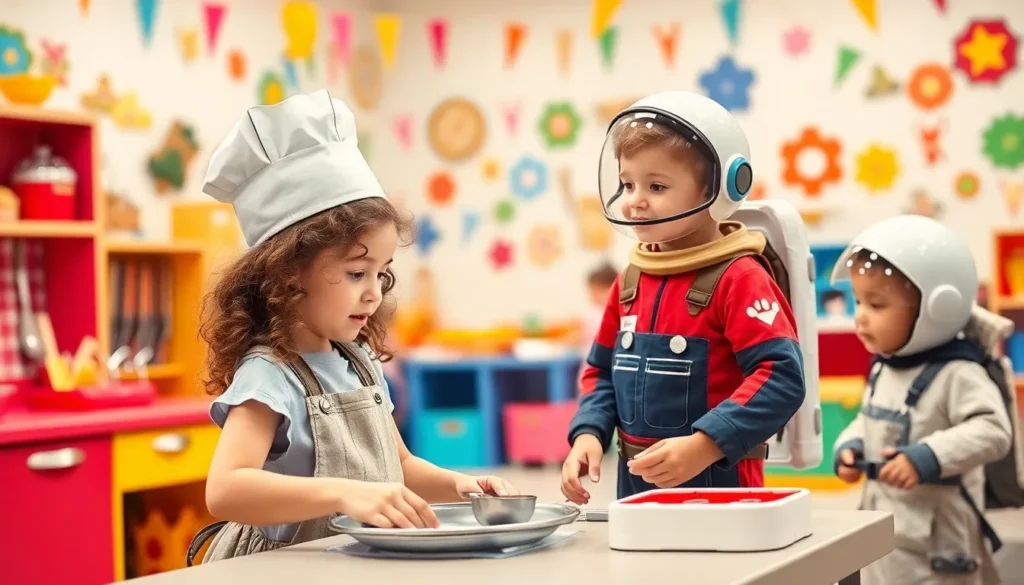Table of Contents
ToggleConsidering adoption can feel like navigating a rollercoaster blindfolded. It’s a whirlwind of emotions, decisions, and a sprinkle of confusion. But don’t worry; it’s not just you. Many parents find themselves in situations where they need to explore this life-altering choice. Whether it’s due to personal circumstances or a desire to provide a better life for their child, the decision to put a child up for adoption can be both heart-wrenching and empowering.
Understanding Adoption
Adoption involves a significant decision-making process for parents and children alike. It encompasses various legal and emotional steps to ensure a suitable environment for the child.
What Does Putting Child Up for Adoption Mean?
Putting a child up for adoption refers to the legal process where a parent relinquishes their rights to their child so that another individual or family can adopt them. This choice often arises from the belief that the child would have better opportunities in a different environment. Parents may encounter various factors influencing their decision, including financial instability, personal circumstances, or the desire for their child to grow in a more supportive setting. Adoption isn’t merely a transfer of custody; it represents a profound commitment to seeking what’s best for the child.
Types of Adoption
Adoption includes several types that cater to different circumstances and preferences. Domestic adoption occurs within the same country, allowing children to be placed with families in their home country. International adoption involves adopting a child from abroad, which requires navigating specific legal processes in both nations. Foster care adoption happens when children in the foster system are permanently placed with adoptive families. Open adoption allows for ongoing contact between birth parents and adoptive families, while closed adoption maintains privacy for both parties. Each type serves various needs and desires, providing routes for creating loving families.
Reasons for Putting Child Up for Adoption
Numerous factors drive the decision to put a child up for adoption. Personal circumstances and financial considerations often weigh heavily on parents’ choices.
Personal Circumstances
Personal circumstances significantly impact the decision to choose adoption. Unplanned pregnancies may create feelings of uncertainty for parents. Emotional struggles like mental health issues can also contribute, making it difficult to provide the best care. Relationship instability, whether due to separation or divorce, often leads to reconsidering family dynamics. In cases of illness or incapacity, parents may recognize that another family can better fulfill a child’s needs. These realities prompt many to consider adoption as a way to ensure a nurturing environment.
Financial Considerations
Financial considerations frequently influence the choice to put a child up for adoption. Many parents face economic challenges that make raising a child difficult. Rising living costs, including housing, healthcare, and education, create additional stress. Inability to access necessary resources can result in feelings of inadequacy regarding parenting capabilities. Some expectant parents may believe that adoption offers their child a better lifestyle and opportunities. Addressing financial stability becomes essential for parents seeking a secure future for their child.
The Process of Adoption
Adoption involves multiple steps and considerations that require careful thought. Various actions help create a stable environment for the child while also addressing the emotional aspects of the decision.
Steps to Take Before Putting Child Up for Adoption
Consider reaching out to adoption agencies early. Understanding available options provides insight into domestic and international adoption processes. Assessing personal circumstances aids in determining the best path forward. Counseling can offer support and clarity during this emotional period. Engaging with experienced professionals helps navigate the complexities associated with adoption. Exploring potential adoptive families enables better matches based on values and preferences.
Legal Considerations
Legal aspects of adoption are crucial for a smooth process. Researching state laws ensures compliance with specific regulations regarding parental rights. Consulting with a lawyer skilled in family law can clarify legal obligations and procedures. Preparing necessary documentation simplifies the legal steps involved. Understanding the difference between open and closed adoptions shapes future relationships with the child. Finalizing legal agreements secures the child’s placement in a loving environment.
Emotional Impact of Adoption
Adoption significantly affects all parties involved. Birth parents often experience a complex mix of grief, relief, and empowerment when making the decision to place their child for adoption.
On Birth Parents
Many birth parents feel deep emotional turmoil throughout the adoption process. They face the pain of separation while simultaneously recognizing the potential benefits for their child. Some may grapple with feelings of guilt or shame, especially if societal pressures contribute to their decision. Support systems and counseling play crucial roles in helping birth parents process these emotions. Positive outcomes, such as knowing their child is in a loving environment, can bring a sense of solace and hope for the future. Finding peace often entails a personal journey of acceptance and connection to the child’s well-being.
On Adopted Children
Adopted children experience a range of emotions, too. They may struggle with feelings of abandonment or confusion regarding their identity. Many benefit from open communication about their adoption story, fostering understanding and acceptance. Building healthy attachments with adoptive parents is crucial for emotional stability. Programs and resources tailored to adopted children often facilitate smoother transitions and adjustment. Support from peers and professionals significantly impacts their development, helping them to feel secure and valued. An open dialogue about their unique backgrounds can instill a strong sense of belonging and confidence.
Finding the Right Adoption Agency
Choosing the right adoption agency plays a crucial role in the adoption process. An appropriate agency provides necessary support and guidance throughout this journey.
What to Look For
Look for an agency with a strong reputation and positive reviews. Assess their experience in handling the specific type of adoption being pursued. Evaluate their range of services, including counseling and post-placement support. Consider the agency’s transparency regarding fees and policies. Compatibility with personal values is essential, ensuring that the agency’s approach aligns with what feels right. Prioritize agencies that prioritize the needs of both the child and birth parents, ensuring a nurturing environment for all parties involved. The agency’s accessibility and responsiveness can significantly influence the overall experience.
Questions to Ask
Ask about the agency’s success rates in matching birth parents with adoptive families. Inquire regarding the specific process and timeline for each type of adoption. Understanding the agency’s policy on open or closed adoptions is important. Discuss how they provide support to birth parents before, during, and after the adoption process. Clarify their approach to birth parent decision-making and whether they offer counseling services. Explore how the agency facilitates ongoing communication between birth parents and adoptive families. Finally, question their training for staff members in handling emotional complexities during adoption, ensuring a compassionate and understanding approach.
Choosing adoption is a profound decision that reflects a parent’s love and commitment to their child’s future. It requires careful consideration and emotional resilience as parents navigate the complexities of relinquishing parental rights. By seeking support and understanding the various types of adoption, parents can make informed choices that align with their values and circumstances.
The journey may be filled with challenges but also offers the possibility of creating nurturing environments for children to thrive. With the right resources and guidance, birth parents can find peace in their decisions while ensuring their children have the opportunities they deserve. Embracing this path can lead to fulfilling outcomes for all involved, fostering love and connection within new families.










